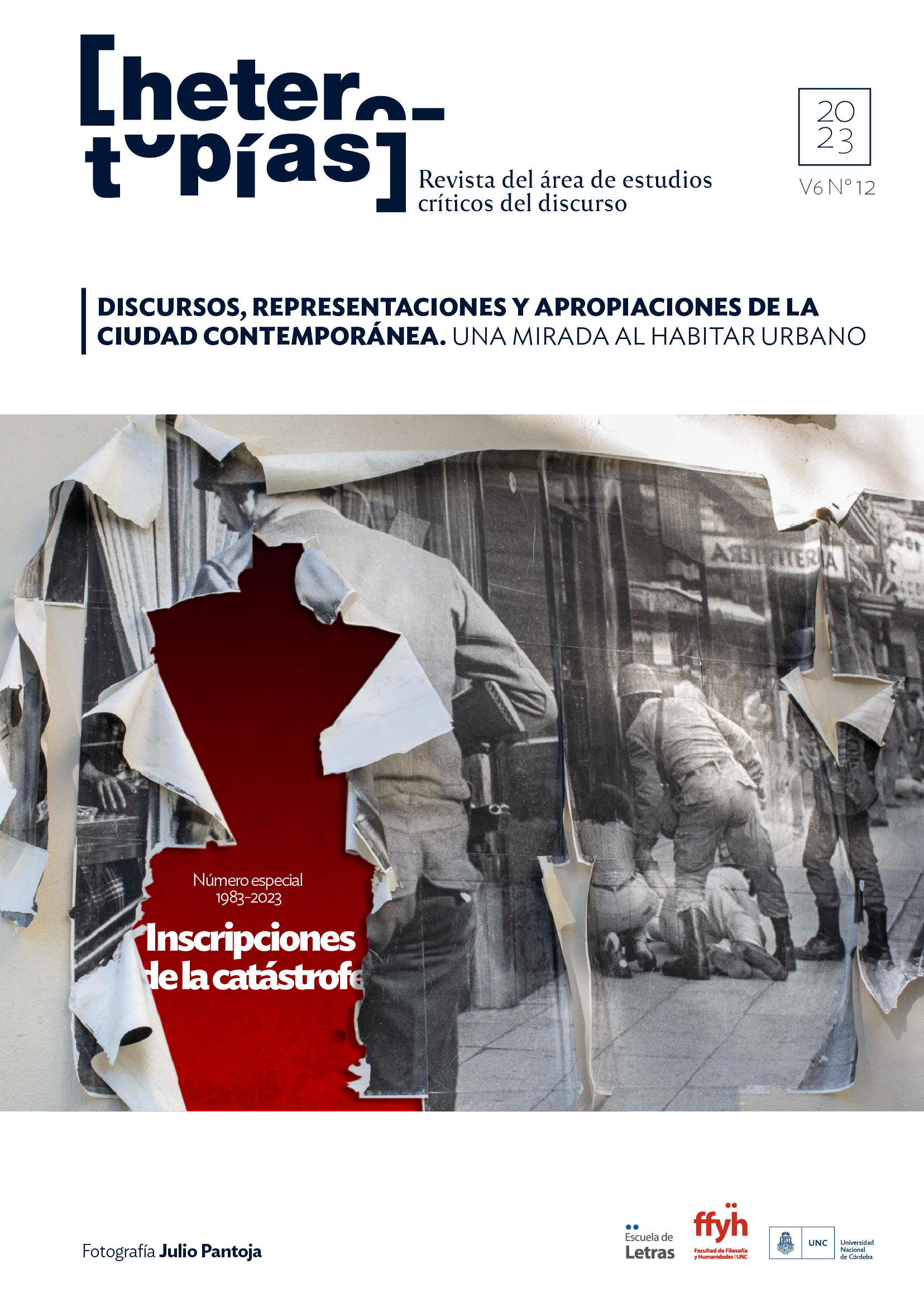Melancholy and Darkness. Dilemmas of Subjectivity in the Dark series
Main Article Content
Abstract
Dark is a German TV series that, despite its obsession with time travel and the end of time, portrays melancholy as its predominant emotional experience. To account for this, the article recovers some arguments from Julia Kristeva’s semiology: a theoretical conception that historicizes the meaning of affects as a modality of significance that constitutes subjectivity. In Kristeva’s terms, melancholy deploys an affective semiotics that is linked to fragility of love, finding its resonances in corporality, but also in a decentred temporality that would respond to the depressive economy of postmodern culture. Netflix fiction inventively presents this melancholic pathos, not only capturing epochal breaks related to subjectivity and its way of inhabiting time, but also proposing such affect as an dark tonality that flows throughout its visuality, more specifically through those procedures of representation linked to chromaticism, temperatures and aesthetic composition. From this reading, the article seeks to demonstrate how Dark manages to make melancholy a matter of content, but also of form.
Downloads
Article Details

This work is licensed under a Creative Commons Attribution-NonCommercial-ShareAlike 4.0 International License.
Those authors who have publications with this journal, accept the following terms: Those authors who have publications with this journal, accept the following terms:
a. The authors will keep their copyright and guarantee to the journal the right of first publication of their work, which will be simultaneously subject to the Creative Commons Attribution - Non-Commercial - Share Alike (by-nc-sa) Attribution License; no commercial use of the original work or any derivative works is allowed, the distribution of which must be done with a license equal to the one that regulates the original work.
b. Authors may adopt other non-exclusive license agreements for the distribution of the published version of the work (e.g., deposit it in an institutional telematic archive or publish it in a monographic volume) provided that the initial publication in this journal is indicated.
c. Authors are allowed and recommended to disseminate their work through the Internet (e.g. in institutional telematic archives or on their website) before and during the submission process, which may lead to interesting exchanges and increase the number of citations of the published work. (See The effect of open access).
How to Cite
References
Arfuch, L. (2016). El “giro afectivo”. Emociones, subjetividad y política. deSignis, 24, 245-254.
Amícola, J. (2003). La batalla de los géneros. Novela gótica versus novela de educación. Rosario: Beatriz Viterbo Editora.
Arán, P. (2016). Julia Kristeva, audaz lectora de Bajtín. En Arán, P. (ed.). La herencia de Bajtín. Reflexiones y migraciones (pp. 17-34). Córdoba: Edicea.
Bartra, R. (2021). Melancolía y cultura. Las enfermedades del alma en la España del Siglo de Oro. Barcelona: Anagrama.
bo Odar B. y Friese J. [creadores] (2017-2020). Dark [serie de televisión]. Temporada 1-3. Alemania: Wiedemann & Berg - Netflix.
Bontems, V y Lohoucq, R. (2019). Las ideas negras de la física. Agujeros, materia y cuerpos: por qué abunda lo oscuro. Buenos Aires: Autoría Editorial.
Bordelois, I. (2006). Etimología de las pasiones. Buenos Aires: Libros del Zorzal.
Colquhoun, M. (2021). Egreso. Sobre comunidad, duelo y Mark Fisher. Buenos Aires: Caja Negra.
Crespo, I. (2017). “Dark”, misterio sin nostalgia. El País, edición digital. Recuperado de https://elpais.com/cultura/2017/12/01/television/1512131212_503549.html
Culleré, C. (2008). Un oscuro esplendor. El doble y el laberinto en la novela gótica. Córdoba: Editorial Babel.
Elgue-Martini, C. (2008). Melancolía y nostalgia: Algunas reflexiones teóricas. Revista de Culturas y Literaturas Comparadas, 2(1), 11-22.
Greimas, A. (2022). Da nostalgia. Estudo de semântica lexical. Estudos Semióticos, 18(1), 1-8.
Gómez Ponce, A. (2021). Dark, o el ocaso de la temporalidad. En Duarte J. (comp.). Spoilers del presente. Ver series para ser de nuestra época (pp. 199-214). Córdoba: Editorial Universidad Nacional de Córdoba.
Gómez Ponce, A. (2022). It’s not an affect: It’s HBO. Los afectos en los tiempos seriales del capitalismo tardío. En Aguilar Alcalá, S. y Gómez Camarena, C. (eds.), La venganza de la televisión: el audiovisual contemporáneo y sus nuevas preguntas (pp. 79-100). México: Editorial Universidad Iberoamericana.
Illouz, E. (2012). Por qué duele el amor. Una explicación sociológica. Barcelona: Katz.
Ivanov, V. (2002). Bosque. En R. Acosta (ed.). El árbol del mundo. Diccionario de imágenes, símbolos y términos mitológicos (pp. 85-88). La Habana: Criterios.
López Seoane, M. (2023). Donde está el peligro. Estéticas de la disidencia sexual. Rosario: Beatriz Viterbo Editora.
Jameson, F. (1996). La teoría de la posmodernidad. Madrid: Editorial Trotta.
Jameson, F. (2014). El fin de la temporalidad. En Jameson, F. Las ideologías de la teoría (pp. 752-778). Buenos Aires: Eterna Cadencia
Klein, E. [creador] (2021). Time, explained. Explained [serie de televisión]. Temporada 3, Episodio 12. Estados Unidos: Vox / Netflix.
Kristeva, J. (1986). Al comienzo era el amor. Psicoanálisis y fe. Barcelona: Gedisa.
Kristeva, J. (1988). Poderes de la perversión. Ensayo sobre Louis-Ferdinand Céline. Buenos Aires: Siglo XXI.
Kristeva, J. (1995). Las nuevas enfermedades del alma. Madrid: Ediciones Cátedra.
Kristeva, J. (2009). Historias de amor. Buenos Aires: Siglo XXI.
Kristeva, J. (2015). Sol negro. Depresión y melancolía. Buenos Aires: Editorial Waldhuter.
Kristeva, J. (2019). Cada sesión es una poética, cada persona una poesía. Una conversación con Julia Kristeva. Entrevista por Mariano Horenstein. Calibán. Revista Latinoamericana de Psicoanálisis, 17(1), s/n.
Negroni, M. (2015). La noche tiene mil ojos. Buenos Aires: Caja Negra.
Paris, D. (2003). Julia Kristeva y la gramática de la subjetividad. Madrid: Campo de Ideas.
Sarlo, B. (2003). La pasión y la excepción. Eva, Borges y el asesinato de Aramburu. Buenos Aires: Siglo XXI.
